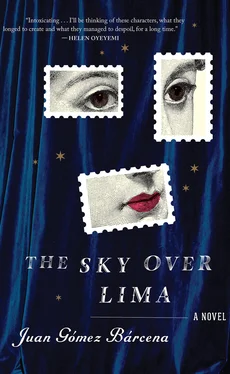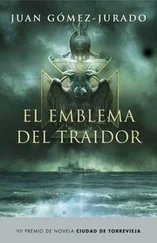One day Martín Sandoval shows up at the house looking for Carlos and is ushered into his bedroom. He comes bearing his own version of events — they have accepted a twenty percent increase in wages, victory is ever nearer, etc. — and a stack of books for him to read during his convalescence. Carlos, who is not allowed to get up even during visits, accepts them wordlessly from his bed: Marx, Kropotkin, Bakunin. He doesn’t know what to say. At last he says, “Thank you, they’re very nice,” and as he speaks, he realizes how stupid he sounds. But Martín doesn’t seem to care; he smiles broadly and says he must read them all. On his way out he winks and raises his left fist, and Carlos responds by raising his right. Martín laughs.
That same day, José also comes to visit. Don Augusto interrupts them a number of times during their conversation. He is thrilled to have a Gálvez, a descendant of the heroes of the Pacific, calling at his home. So he keeps reappearing under various implausible pretexts, giving exaggerated bows and plying his guest with wine and cigars that José simply must try and that José does not try. Carlos squirms in his bed. He mutters a few scathing words that his father does not hear. As he sees it, his father is behaving like a fawning footman eager to please his master with a few clever comments, and José receives the offerings with frosty graciousness. Don Augusto also brings in a newspaper describing events abroad and attempts a verbatim recitation of an article on the Russo-Japanese War he’s just memorized; in his opinion, he says, despite the Yalu River victory, the Japanese will be utterly vanquished; they’ll see when the Baltic fleet of Admiral Rozhestvensky — is he pronouncing that damned difficult name correctly? — rounds the Cape of Good Hope and surprises them from the south; Czar Nicholas isn’t going to let a bunch of yellow men from the far ends of the earth tell him where he can and cannot dock his ships. Doesn’t José agree? he asks when he runs out of ideas — which is to say, right where the article ended. Gálvez doesn’t know anything about the war, but he pretends to reflect a moment. At last he smiles a genuine smile and says he does not agree, that in fact he and his father believe just the opposite: that the Russians are out of options and that Japan is going to trounce the czar and the aforementioned Rozinsky. Don Augusto blinks a moment, stammers, rolls and unrolls the newspaper a couple of times— Why don’t you just go away, thinks Carlos, and stop making us look ridiculous? — and finally says that he hadn’t seen it like that, but, come to think of it, the Gálvez analysis does make sense, that Japan is going to win and not Russia. Indeed, he has no doubt, and it is so obvious now that he has considered it carefully, he is embarrassed to have thought otherwise. He leaves.
At long last, he leaves.
And only then can José perch on the edge of the bed and tell Carlos why he has come. The novel, of course. Now that the strike is finally over, a wide array of possibilities will open before them, and they cannot pass them up. So they must answer the letters, which have just arrived — did he not say that already? Six of them, no less, six envelopes that languished a month in the hold of one of the ships. It takes Carlos a few moments to realize that José has already read the letters, that for the first time he has not waited for him — that he hasn’t even brought them with him. He hasn’t brought them, and Carlos has to say that it’s fine, that it doesn’t matter, that he forgives him for that too.
“Since you were sick…”
“It’s fine.”
“I’ll bring them to you.” José pats the sheets and, below them, Carlos’s knees. “I forgot them, but don’t worry, I’ll bring them. You’ll see!”
But that’s not even the best part. Even better is the fantastic idea he had the other day and couldn’t wait to tell him about. He was thinking about the novel and suddenly remembered Schneider’s seven hundred writing tips, specifically one of the few that hadn’t been expunged from his memory by the fire. The one that talked about the middle pages of every novel and how something extraordinary had to take place in them.
“I remember,” says Carlos, propping the pillow up behind him so he can sit up.
“Well, it occurred to me that that’s exactly what’s needed to pique the Maestro’s interest: a little action. The novel has been rather dull so far, don’t you agree?”
“Dull?”
“I mean, nothing much has happened. Of course that’s not necessarily a bad thing. Schneider said that at the beginning of the second act the story always drags a bit — gets a little slow, let’s say. The same thing has happened with us: weeks with those letters rotting in the port. But now…”
“Now what?”
“Now the action begins! The strike, to be precise. We had it right there in front of our noses, and we didn’t see it. Don’t you realize? You yourself said it the other day: you were saying that Georgina would sympathize with the workers. Maybe she’d even go down to scope out the port, don’t you think? And that’s when the action takes off. Police repression! Stampede! Georgina in peril! She could even get injured — why not?”
“And what the hell does that get us?”
“What do you mean, what does that get us? For starters, a rip-roaring chapter. And then, imagine the Maestro’s reaction… his transatlantic friend at death’s door! That would awaken anyone’s emotions, you must admit. Poets’ muses are always on the verge of croaking. That’s probably why they’re muses. And maybe that’s what Juan Ramón needs to make up his mind…”
Carlos asks for a cigarette. His mother has forbidden him to smoke during his convalescence, but to hell with that. He needs a cigarette. And he also needs a moment to reflect — the time that it takes José to stand up, fetch his coat, take a cigarette out of his case, light it.
“It’s just a suggestion, of course,” José continues before Carlos has exhaled the smoke from his first drag. “I know Georgina is your thing. But I thought it might make a splendid chapter. Georgina would also talk about the workers and how worried she is about their situation. It fits her personality, don’t you think? The concern for people in need. You could put in those things you were telling me in the port. All that stuff about twenty soles a day…”
“Two soles .”
“Whatever. What do you think? Don’t tell me there’s not any material there.”
Carlos feels his blood beating against the stitches of his wound and tastes the acrid smoke in his mouth.
“Yes… I guess it’s not a bad idea,” he murmurs.
Gálvez scratches his ear.
“It was actually Ventura’s idea, you know? He and I… well, let’s say he’s going to give us a hand with the novel. As long as you have no objections, of course.”
“Ventura?”
“You don’t remember him? You must know him. Ventura Tagle-Bracho… the fellow with the pipe.”
Ventura — of course. Carlos remembers having seen him at the club a few times, with his pipe and his somewhat rough manners. He especially remembers the way Tagle-Bracho always looked down at him from the disdainful heights of his last name, whose hyphenated sonority could intimidate even the Gálvezes. He doesn’t like Ventura. But fortunately he remembers his mirror mimicry exercises in time and almost effortlessly pulls off what looks like perfect assent. Only his hand betrays him: an involuntary movement, brusque and contemptuous, that drops cigarette ash on the bed.
“I knew you’d agree! That chap has marvelous ideas, you’ll see.”
“I didn’t know he enjoyed literature,” Carlos says slowly, careful not to erase the expression from his face.
Читать дальше












